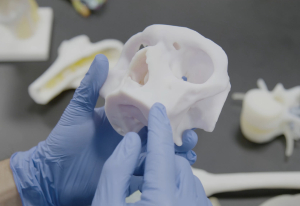by
Gus Iversen, Editor in Chief | March 03, 2023
Stratasys and Ricoh USA have signed an agreement to bring on-demand 3D-printed anatomic models to clinical settings, providing a range of benefits for planning and practicing complex surgeries, as well as improving communication between medical staff, the patient, and their family.
The patient-specific models utilize the polymer 3D printing expertise of Stratasys, the cloud-based segmentation-as-a-service solution from Axial3D, and precision additive manufacturing services from Ricoh. Working together, they allow a process that normally takes weeks to be completed in days, without the need for onsite 3D printing equipment or additive manufacturing technical expertise.
Customers can upload medical files to a secure cloud-based service where Axial3D’s AI-powered software automatically converts medical scans into 3D-printable files. The files are then printed on Stratasys 3D printers at Ricoh’s ISO 13485 certified facility, with the models shipped directly to the care facility.



Ad Statistics
Times Displayed: 78310
Times Visited: 2782 Ampronix, a Top Master Distributor for Sony Medical, provides Sales, Service & Exchanges for Sony Surgical Displays, Printers, & More. Rely on Us for Expert Support Tailored to Your Needs. Email info@ampronix.com or Call 949-273-8000 for Premier Pricing.
Axial3D, a medtech startup in the U.K. focused on medical segmentation, announced the closing of a $15 million investment round last November, which was led by a strategic investment of $10 million from Stratasys.
Stratasys has estimated the opportunity for medical 3D printing at approximately $2.8 billion.
“We are providing an opportunity for healthcare providers to access state-of-the-art, precision additive manufacturing without absorbing the overhead costs,” said Gary Turner, managing director of Additive Manufacturing, Ricoh USA. “Offering this solution means democratized, wider access to patient-specific 3D-printed models that can improve outcomes and the patient experience, while also enhancing physician education and training.”
The service will be available starting March 3, 2023.

